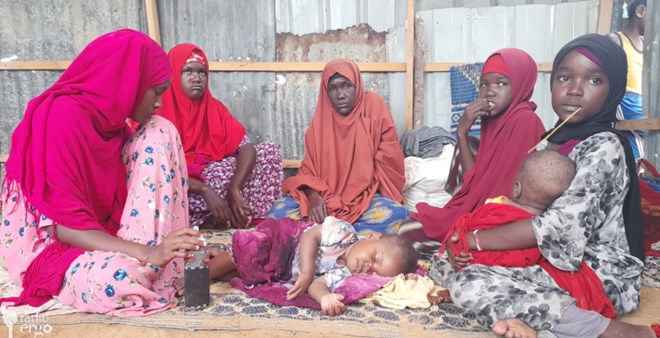
Tuesday September 28, 2021

Fadumo (centre) and her children are among 300 families displaced by river Shabelle floods from Jowhar, who are lacking food and shelter in Mogadishu/Mohamed Abdi Hassan/Ergo
(ERGO) – After losing everything in recent river floods in southern Somalia’s Jowhar district, Maryan Mohamed Subeir and her 10 children walked from their village the sixty five kilometres to the town of Balad, where they were given a ride in a vehicle going further south to Mogadishu.
Maryan, whose youngest child is five, told Radio Ergo that she and her children had gone for days without eating in their village of Ba’aadlay, 25 km from Jowhar town, as the floods swept away their two-hectare farm, her small shop, and three-roomed house.
“We lived in a rural village, where no one was in a position to help the other. At least now since we came to Mogadishu, we have been getting one meal a day. We didn’t have that before, so it means a lot to us,” she said.
Maryan, who is divorced, is among 300 families affected by the floods in Jowhar who have arrived in Mogadishu’s Deynile suburb during early September.
“The floods washed away my shop. I stocked it just some days before the catastrophe. I used to sell sugar, rice, spaghetti and flour among other items. I used to stock the shop on credit and repay after my sales,” she said.
They have no food or shelter and are being hosted by a local family in Deynile, where they are camped in the compound and given some cooked food once a day.
“We don’t have a shelter, and we are looking for one now. Even if we get a place, we don’t have the resources to build. The man who is hosting us has a wife and children to take care of and we are burdening him. There are no labour jobs, even for those of us who have the strength to work.”
Fadumo Osman Amir, a mother of 12, also brought her children to Deynile after the farm they lived off was flooded in Bodale village.
“I had 20 goats and around 100 chickens, all of which were killed in the floods. The floods also washed away my farm where I planted maize, pumpkins, tomatoes and beans. I invested 15 million Somali shillings ($600) in the farm, and I have nothing to show for it now, all of it is gone. We just fled with our lives,” she said.
Fadumo has been going out to beg for food every morning. She and the children are staying with a family already settled in Buudhere IDP camp, but as the flimsy hut has no space they are sleeping outside. Their hosts let her use their utensils and a place to cook, as she came with nothing.
Her husband stayed behind in Bodale hoping to clear the floodwater from the village and their three-hectare farm, along with other local men.
Deynile district administration’s head of social affairs, Abdullahi Hirey Alasow, told Radio Ergo that they have prepared a site where at least 400 families could settle, but none of the families can afford to build their own houses.
“We can only provide them land and security and ask the locals who can assist to help these families. The IDP families are arriving daily,” he said.
Abdullahi said each year hundreds of families displaced by conflict, drought and floods join the IDP camps in Deynile. He called on the Somali government to develop a plan to help these families so that the humanitarian situation in the camps does not deteriorate.